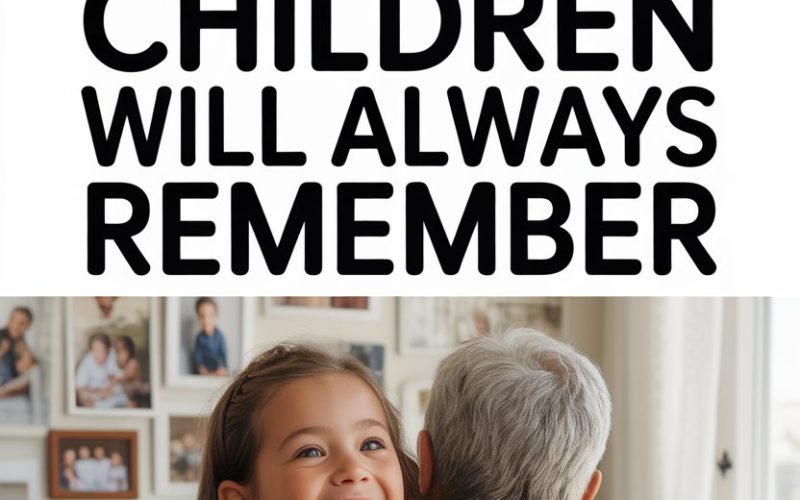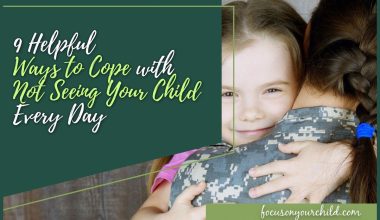Every parent wonders which moments will stick in their children’s minds long after the last school run or the final bedtime story.
We worry about the big things: family holidays, major milestones, maybe that time you accidentally called the class teacher “mum” in front of everyone (don’t worry, they’ll recover).
But children are absolute experts at treasuring the small, everyday moments—the ones we might overlook in the daily grind of lunchboxes, lost socks, and the never-ending mystery of the missing left shoe.
1. How You Made Them Feel
Your mood and attitude set the tone for your household. Children are attuned to how you respond to their wins and wobbles.
It’s not about being perfect, or never losing your rag. It’s about showing them they’re loved—mistakes, tantrums, wonky drawings and all.
Think back to your own childhood. Odds are, you remember more about the warmth (or lack of it) in your home than the brand of trainers you wore.
Experts agree that emotional climate leaves the deepest mark.
2. Family Traditions
Birthday pancakes shaped like dinosaurs. A made-up holiday where you all wear odd socks. Movie night every Friday.
Traditions anchor children and give them something to look forward to—even if they groan and roll their eyes when they’re thirteen.
You don’t need to get fancy. Consistency is key, not Pinterest-worthy perfection.
Years from now, your child might not recall who won Monopoly, just that you all played (and probably accused each other of cheating).
3. How You Spoke to (and About) Others
Children are world-class eavesdroppers—trained by years of overhearing you spell out words you don’t want them to understand. They clock how you speak to your partner, the postie, the cat, and especially about others behind their backs.
If kindness and respect are the norm in your home, your child will absorb it like a sponge. If sarcasm or shouting is the soundtrack, that tends to stick, too.
4. The Times You Really Listened
Ever zone out while your child recounts the plot of a cartoon in mind-numbing detail? (Guilty as charged.) Still, the moments you really listen—kneeling down, eye contact, no phone in hand—feel huge to your child.
Active listening sends a message: “What you say matters to me.” That feeling can last a lifetime, long after the plot of ‘Super Llama Squad’ is forgotten.
5. Your Reactions to Their Mistakes
Spilt juice on the carpet. Forgotten PE kit. That time they shaved the dog. The way you react when things go sideways teaches them how to respond to their own blunders.
Calm problem-solving (after a deep breath and maybe a silent scream into a cushion) models resilience far more than a perfectly tidy home ever will.
6. Moments of Undivided Attention
You know the drill: dinner bubbling, emails pinging, laundry multiplying like rabbits. Yet five minutes of your undivided attention—putting the phone down, making silly faces, or just building a wobbly tower of blocks—can make your child’s week.
Small, regular doses of one-on-one time matter more than the occasional grand gesture. Studies show that attention is a child’s favourite love language.
7. Your Silliest Side
Dance parties in the kitchen. Making up ridiculous songs on the drive to school. The time you wore a banana costume just because it made them laugh.
Silliness is the glue that holds families together, and children remember when their parents drop the adult act and join the fun.
Nobody ever says, “My mum was great at saying no to puddle jumping.” They remember the splashes.
8. How You Handled Stress
Bills, work woes, burnt toast for the third time that week—life gets stressful. Children might not grasp the details, but they notice your coping style.
If you talk openly (and age-appropriately) about your feelings, take breaks, and model healthy ways to unwind (even if it’s just a cuppa and a moan to a mate), you’re teaching invaluable life skills.
Child development experts say children watch what you do under pressure far more than what you say.
9. Apologies (and Forgiveness)
Nobody gets it right all the time. Losing your cool, overreacting, or saying the wrong thing happens. What matters is owning it. “I’m sorry I shouted. That wasn’t fair.”
These are powerful words for a child to hear—and even more powerful to see in action.
It teaches humility, and that love isn’t withdrawn just because someone messes up.
10. The Books You Read Together
Bedtime stories are tiny, magical rituals. The smell of the book, your silly voices for the baddie, the way you always had to read that one page twice—these moments get woven into the fabric of childhood.
Countless adults can recite whole sections of their favourite childhood books, word-perfect. Reading together has proven benefits for both bonding and brain development.
If you’re not a “reading aloud” family, audiobooks count—no shame in outsourcing your Gruffalo impression.
11. Family Meals
Whether it’s a roast on Sunday, toast on Tuesday, or a takeaway on the sofa, shared meals stick in the memory. Not because of the cuisine (though everyone has a nostalgic dish), but because of the togetherness.
Children soak up those moments when everyone’s gathered, even if someone’s sulking and the peas are burnt. Rituals around the table can be a safe haven in a busy world.
12. Words of Encouragement
You may not remember to praise every spelling test or football match. Good thing you don’t have to.
Children remember the big-picture encouragement: “I love how you keep trying,” or “You make me proud just by being you.”
Positive feedback, especially effort-based praise, fosters resilience and self-worth. Research points to long-term benefits.
(And yes, “nice try stacking those soggy cereal flakes” counts.)
13. The Way You Handled Goodbyes and Reunions
The kiss at the school gate. The big bear hug after a long day. These little rituals of parting and reuniting help children feel secure.
Children remember being sent off with warmth (not a harried “hurry up, we’re late!”). And coming home to a parent who acts like seeing them again is the best part of the day—even if you still have to check their bag for uneaten lunches.
14. The Times You Showed Up
It’s impossible to make every school play or sports match. But the moments you do show up—cheering louder than anyone, waving from the audience, or just being there with a “well done!”—get banked in your child’s memory for keeps.
Children measure love in presence, not presents. Even quiet support counts. Experts note that feeling supported makes kids braver about trying new things.
15. How You Cared for Yourself
Here’s a plot twist: children notice when you put yourself last, but they also remember when you take care of your own needs. A parent who rests, laughs, meets friends, or pursues hobbies models that adulthood isn’t all slog and sacrifice.
Show them that self-care isn’t selfish—it’s the secret fuel for looking after others, too.
A Hopeful Takeaway
Looking at this list, you might spot a theme. Children remember our love, our presence, and the real-life messiness of family life—not the size of our house, the car in the drive, or whether their lunch had hand-cut carrot sticks shaped like tiny hedgehogs.
Tonight, give yourself permission to focus on one small thing. Read that extra page at bedtime. Share a silly story from your day. Or just sit quietly together, letting your child know you’re there.
They won’t remember the day’s to-do list, but they’ll remember you—imperfect, loving, and fully present. And that’s more than enough.




